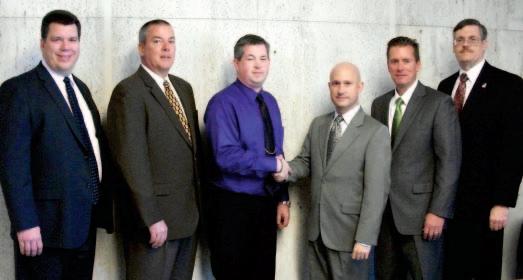
3 minute read
INDUSTRY NEWS
Phones in DIY Chains
by Robert L. DiLonardo
DiLonardo is a well-known authority on the electronic article surveillance business, the cost justification of security products and services, and retail accounting. He is the principal of Retail Consulting Partners, LLC (www.retailconsultingllc.com), a firm that provides strategic and tactical guidance in retail security equipment procurement. DiLonardo can be reached at 727-709-6961 or by email at rdilonar@tampabay.rr.com.
By now everyone has seen the Konica Minolta commercial in which the young workers standing around the Bizhub are complaining about how difficult copying and faxing was in the “old days.” The clip ends when one of the people spots “the elder…he who speaks of floppy disks” who, in turn, tells the workers that they’re “soft.”
Soon, retailers are going to be able to tell a similar story about high-tech telephones, such as Apple’s iPhone and Motorola’s digital assistants, in the soon-to-be “mobile” POS transaction process. Elders, like me, will point back in time to old-school methods, such as computer terminals, credit card authorization readers, and cash registers.
Recently, Home Depot and Lowe’s, the two largest do-it-yourself (DIY) chains, have decided to deploy hand-held units to store associates that will assist with transactions, inventory control, and other customer-centric issues.
Home Depot was first out of the gate with a late-2010 decision to deploy over 30,000 customized Motorola MC75 Enterprise Digital Assistants, called the First Phone. The unit is a combination walkie-talkie and VoIP telephone with intelligence capabilities that include inventory management and analytics functions, POS, and label-printing functions. Several million phone-assisted POS transactions later, the company credits it with helping to increase “customer facing” hours.
Home Depot’s asset protection organization was instrumental in minimizing any theft, fraud, or risk vulnerabilities in the new system. Mike Lamb, Home Depot’s vice president of asset protection, calls the First Phone a “significantly effective tool with regard to shrink mitigation.” Though the project was designed to improve the customer experience and streamline store operations, Lamb observed that “as we have gained efficiencies in inventory management with the First Phone, we inherently have a better ‘line of sight’ on methods to improve shrink performance across the enterprise.”
With its recent decision to purchase and deploy 42,000 iPhone 4s, Lowe’s experiment is part of a larger mission to upgrade its POS system by replacing 72,000 POS computer screens with flat panels, and retire thousands of scanners circa the early ‘90s. Each store will receive about twenty-five iPhones for use at the POS, and for calling, texting, emailing, and helping to answer customers’ questions. The company is also increasing bandwidth for transmitting data, adding in-store WiFi for shoppers, and offering a MyLowes phone application that was made available in October.
3Biometrics Eliminates PINs, Thwarts Internal Theft at KFC
Biometrics has been slowly, but steadily gaining traction within the retail industry because it is a near-perfect way to make certain that someone is authentic, that is, who he or she claims to be. Its major uses are for access control or identity verification in credit and debit card transactions.
The fast-food industry is quickly becoming a major believer in biometrics because it has proven to be a strong deterrent to payroll fraud known as “buddy punching” and unauthorized sales transactions. Restaurant News recently reported that two large KFC franchisees, West Quality Food Service and KBP Foods, have recently announced deployments of equipment supplied by DigitalPersona, Inc. Both franchisees have seen improved operating profitability.
Biometrics has been employed in order to eliminate the need for personal identification numbers (PINs) at the point of sale and the time-and-attendance system. Under the old system, employees were able to share PINs to inappropriately clock-in one another, or use managers’ PINs to authorize fraudulent transactions. KBP Foods requires everyone to use the biometric reader to access any store systems. They have taken the additional step of requiring a manager’s fingerprint to approve any early clock-ins or overtime. West Quality Food Service has seen a near-immediate reduction in food costs that they attribute directly to the elimination of false voids and overrides.
Join Us Online
LP central our LinkedIn group is called LP central because it is the central meeting place for LP professionals who want to connect with their peers to discuss important issues in the industry.
LP voices our Facebook page, LP voices, allows LP professionals to share not only the activities they are involved with in the industry, but also their personal lives with their friends, family, and community.
LP mag the magazine’s twitter page is @LPmag, where you can get frequent updates on what’s happening in the world of loss prevention.








